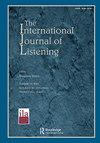Listening Comprehension Problems of FL Learners in a Peer Interactive, Self-Regulated Listening Task
Q1 Arts and Humanities
引用次数: 6
Abstract
It is vital to understand the listening problems students face in a foreign language (FL) classroom. In the current study, students were provided with options to identify these problems. Twenty-eight A1 level Turkish secondary school students worked in pairs and had autonomy to control the audio while listening. While dialogic exchanges illustrated articulated listening comprehension problems in a natural and observable way, self-control data enabled the researcher to observe how students chose to operate the input after encountering such difficulties. Students mostly experienced problems related to process, listener, affect, and input, followed by social- and task-related problems. The most frequent problems were mental translation, inability to chunk streams of speech and difficulty keeping pace with the delivery. In terms of self-controlling the input, students operated the audio mainly to check understanding and catch up with the speed of speech. With the help of these valuable data, the current study aims to highlight the possible benefits of peer interaction by portraying how students experienced and shared the mental, affective, and social processes involved in listening.同伴互动、自我调节听力任务中外语学习者的听力理解问题
了解学生在外语课堂中所面临的听力问题是至关重要的。在目前的研究中,学生可以选择识别这些问题。28名A1级的土耳其中学生两人一组,在听的同时自主控制音频。对话交流以自然和可观察的方式说明了清晰的听力理解问题,而自我控制数据使研究人员能够观察学生在遇到此类困难后如何选择操作输入。学生最常遇到的问题是过程、倾听者、情感和输入,其次是社会和任务相关的问题。最常见的问题是心理翻译、无法分词、难以跟上演讲的节奏。在自我控制输入方面,学生操作音频主要是为了检查理解和跟上语速。在这些有价值的数据的帮助下,当前的研究旨在通过描绘学生如何经历和分享涉及听力的心理、情感和社会过程来强调同伴互动可能带来的好处。
本文章由计算机程序翻译,如有差异,请以英文原文为准。
求助全文
约1分钟内获得全文
求助全文
来源期刊

International Journal of Listening
Arts and Humanities-Language and Linguistics
CiteScore
4.70
自引率
0.00%
发文量
16
 求助内容:
求助内容: 应助结果提醒方式:
应助结果提醒方式:


